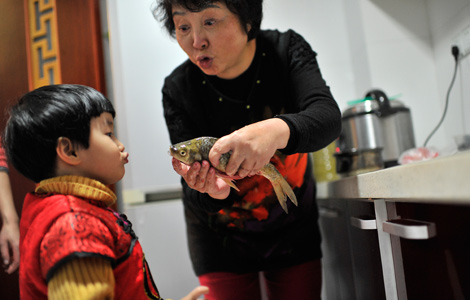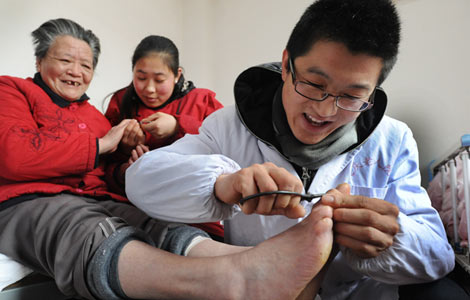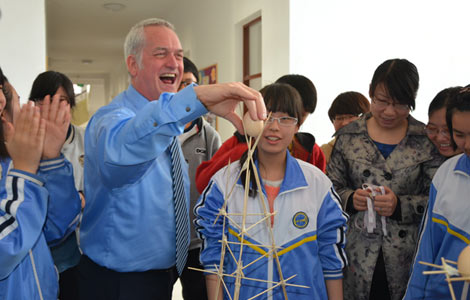Restoring a link to their heritage
Updated: 2013-12-24 07:41
By Elaine Tan (China Daily)
|
||||||||
Laying foundations
Lisa Lim, 38, who also studied in a national school, had long regretted not picking up one of the most important languages in the world. When her husband found a job with a hospitality and real estate development company in China, she jumped at the chance to immerse her children in the language and culture. They moved to Xi'an in 2008 and Guizhou three years later.
Lim schools her daughters, Yin Ching, 11, and Yin Ling, 8, at home, but has hired a Chinese-speaking nanny to help the children pick up the language.
"Through her, we learned the foundations of pronunciation and speaking with the local community in their own dialect. She read to the kids every day and conversed with them."
While the children are under the guidance of a tutor and study further by reading storybooks, watching movies and learning through education programs in Mandarin, Lim works on her own conversational skills by engaging with the locals.
"I don't shy away," she said. "I put on a smile and try simple conversations, although this can often result in funny incidents when I use the wrong words!" she laughed.
Next up in the study plan is hitting the road more often.
"Traveling is part of our 'textbook'. We have already visited the Terracotta Warriors, the Xixia museum of dinosaurs, ancient towns in Zhejiang, Yunnan, Guizhou and Hunan provinces, and cities such as Shanghai. We would like to see more of China to fuel the kids' interest in the country."
For "bananas" it isn't just about mastering their mother tongue; they are also driven by discovering their roots and Chinese culture. This is why they make their way back to their ancestors' homeland even though language classes are readily available in Malaysia.
"Learning Mandarin there is different. In Beijing, you hear the original language spoken purely, free from the influence of other forms of the Han dialect, which is the case in Malaysia. Also, I had the luxury of time to discover the culture and traditions which made learning the language more fulfilling," said Chen of her three months in China.
Tan said that her year at Shanghai Jiao Tong University fulfilled her desire to learn Mandarin and connect with her roots. After completing her studies, she lived and worked in Shanghai for a further four years before returning to Malaysia in 2007. However, she remains enamored of the city.
"Living in Shanghai has spoiled big city life for me. Now, other cities pale by comparison. I was in New York recently and it didn't hold up to Shanghai, where things are always unexpected and surprising," she said.
Her only gripe is that she still cannot sing her heart out at karaoke sessions, because the lyrics are written with the traditional characters used in Hong Kong and Taiwan. On the Chinese mainland the characters were simplified by government edict in the 1950s.
With more Malaysian-Chinese parents sending their children to Chinese-medium schools, "bananas" may soon become a rarity. Rita Sim, author of Unmistakably Chinese, Genuinely Malaysian, said in a 2012 interview with the national newspaper The Star that more than 95 percent of Chinese parents are sending their children to Chinese-medium schools.
Other Malaysians have recognized that China's growing global importance means learning Mandarin is now important.
Rina Mohd, 44, was an early mover. Back in 1991, she set off for Taipei in Taiwan for a three-month language program.

 A return to motherhood at 60
A return to motherhood at 60
 AK-47 inventor Mikhail Kalashnikov dies
AK-47 inventor Mikhail Kalashnikov dies
 Oil spill from Qingdao blast kills sea life
Oil spill from Qingdao blast kills sea life
 Ice storm hits Toronto
Ice storm hits Toronto
 A man and a child jump off Manhattan building
A man and a child jump off Manhattan building
 Male nurses in demand as caregivers for elderly
Male nurses in demand as caregivers for elderly
 Moving beyond language skills
Moving beyond language skills
 Khodorkovsky says he will not enter Russian politics
Khodorkovsky says he will not enter Russian politics
Most Viewed
Editor's Picks

|

|

|

|

|

|
Today's Top News
Private clubs are targeted by anti-graft campaign
China makes it easier to sue government
China promotes core socialist values
China deliberates adjusting one-child policy
Washington tries to shift spying blame to China
Swift justice urged for murder case
Policies to assist those who lost child
China's moon rover flexes muscles
US Weekly

|

|








